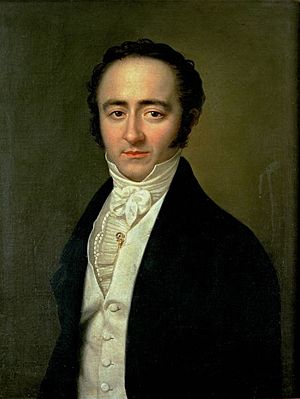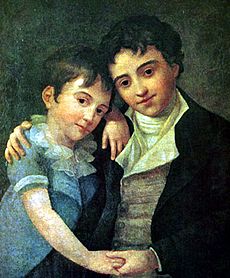Franz Xaver Wolfgang Mozart facts for kids
Quick facts for kids
Franz Xaver Wolfgang Mozart
|
|
|---|---|

Franz Xaver Wolfgang Mozart (1825) by Karl Gottlieb Schweikart (1772–1855)
|
|
| Born | July 26, 1791 |
| Died | July 29, 1844 (aged 53) Karlsbad, Austria
|
| Parent(s) | Wolfgang Amadeus Mozart Constanze Mozart |
| Relatives |
|
Franz Xaver Wolfgang Mozart (born July 26, 1791 – died July 29, 1844) was the youngest son of the famous composer Wolfgang Amadeus Mozart. He was also known as Wolfgang Amadeus Mozart, Jr.. He was a talented composer, pianist, conductor, and teacher. His music style was from the early Romanticism period, and it was greatly inspired by his father's music. He was friends with other well-known composers like Franz Schubert and Robert Schumann. They both thought highly of him.
Contents
Biography
Franz Xaver Wolfgang Mozart was born in Vienna, Austria. This was just a few months before his father passed away. Even though his full name was Franz Xaver Mozart, his family always called him Wolfgang.
Early Life and Education
Wolfgang received excellent music lessons from famous teachers. These included Antonio Salieri and Johann Nepommel Hummel. He also learned how to compose music from Johann Georg Albrechtsberger and Sigismund von Neukomm. He became skilled at playing both the piano and the violin. Just like his father, he started composing music when he was very young. In April 1805, when he was thirteen, Wolfgang Mozart performed for the first time in Vienna. This concert took place at the Theater an der Wien.
Wolfgang became a professional musician. He found some success as both a teacher and a performer. However, he was a quiet person and often doubted his own abilities. He always felt that his music would be compared to his famous father's work. He worried he would not measure up.
Moving to Lemberg
In 1808, Wolfgang needed money. So, he traveled to Lemberg (which is now Lviv in Ukraine). There, he gave music lessons to the daughters of a Polish count. The pay was good, but Wolfgang felt lonely. He was in a small town called Pidkamin.
In 1809, he accepted a new offer. Another Polish nobleman, Count von Janiszewski, asked him to teach his daughters music. This was in the town of Burshtyn. Besides teaching, Wolfgang also gave local concerts. He played his own music and his father's pieces. These concerts helped him meet important people in the region of Galicia.
Life in Lemberg and Travels
After two years in Burshtyn, Wolfgang moved back to Lemberg in 1813. He stayed there for 25 years. During this time, he taught music and performed in concerts. One of his students was Julie von Webenau.
From 1826 to 1829, he led the Saint Cecilia choir. This choir had 400 amateur singers. In 1826, he conducted his father's famous Requiem during a concert. This was at the Ukrainian Greek Catholic cathedral of St. George. From this choir, he created the musical brotherhood of Saint Cecilia. This group started the first music school in Lemberg.
Wolfgang also traveled around Europe to perform. Between 1819 and 1821, he gave concerts in cities like Warsaw, Elbing, and Danzig (Gdańsk).
Later Years and Legacy
In the 1820s, Mozart was one of 50 composers asked to write a variation on a theme by Anton Diabelli. This was for a collection called Vaterländischer Künstlerverein. Around this time, Mozart also met Franz Schubert, and they became close friends until Schubert's death in 1828.
In 1838, Mozart moved to Vienna, and then to Salzburg. There, he became the Kapellmeister (music director) of the Mozarteum. From 1841, he taught the pianist Ernst Pauer.
Franz Xaver Wolfgang Mozart passed away from stomach cancer on July 29, 1844. He died in Karlsbad (now Karlovy Vary) and was buried there. Like his brother, he never married or had children. His will was handled by Josephine de Baroni-Cavalcabò, who had supported him for a long time. His tombstone has a special message: "May the name of his father be his epitaph, as his veneration for him was the essence of his life." This shows how much he respected his famous father.
Works by Genre
Franz Xaver Wolfgang Mozart did not compose as many pieces as his father. His works only go up to opus number 30. After 1820, he seemed to stop composing almost entirely. There was an 11-year gap (from 1828 to 1839) when he did not write any music. Still, you can find recordings of his music today. He mainly wrote chamber music and piano music. His biggest pieces were his two piano concertos.
Orchestral Works
- Sinfonia
- Overture in D major
Concertante Works
- Piano Concerto No. 1 in C major, Op. 14 (1808, published in 1811)
- Piano Concerto No. 2 in E-flat major, Op. 25 (1818)
His two piano concertos are a bit different. The first concerto sounds a lot like his father's later works. It has a youthful energy and uses the piano's full range of notes. The second concerto sounds more like music from the 1810s. It has a more challenging piano part, showing that the younger Mozart was developing his own unique style.
Chamber Works
- Piano Quartet in G minor, Op. 1 (published 1802)
- Sonata for Violin and Piano in B-flat major, Op. 7
- 6 pieces for flute and 2 horns, Op. 11
- Sonata for Violin and Piano in F major, Op. 15
- Sonata for violoncello or violin and piano in E major, Op. 19 (published in 1820)
- Rondo in E minor for flute and piano
Piano Works
- Variations on Minuet from Don Giovanni, Op. 2
- Piano Sonata in G major, Op. 10
- Six Polonaises mélancoliques for piano, Op. 17
- Quatre Polonaises mélancoliques for piano, Op. 22
- Five Variations on a romance from Méhul's Joseph, Op. 23 (published 1820)
- Two polonaises for piano, Op. 24
- Diabelli's Waltz – V28 (He wrote a variation on a theme by Anton Diabelli for a special music collection.)
Choral and Vocal Works
- Kantate an Joseph Haydn auf dessen 73. Geburtstag (Cantata for the 73rd Birthday of Joseph Haydn), FXWM I:2
- Der erste Frühlingstag (The First Spring Day), cantata for solo, choir and orchestra, Op. 28
- "Festchor" for the unveiling of the Mozart monument in Salzburg, Op. 30 (1840)
- Songs with piano accompaniment:
- 8 German songs, Op. 5
- 6 songs, Op. 9
- 6 Songs, Op. 21
- 3 German Songs, Op. 27
- Entzückung
- In der Väter Hallen ruhte
- Ständchen
- Erinnerung
- An Emma ("Weit in nebelgraue Ferne")
Works by Opus Number
- Opus 1: Piano Quartet in G minor (1802)
- Opus 2: Variations in F major on a minuet from Don Giovanni by W. A. Mozart (1805)
- Opus 3: Variations in A major
- Opus 4: Rondeau in F major
- Opus 5: 8 German songs
- No. 1 – Die Einsamkeit
- No. 2 – Das Klavier
- No. 3 – Der Vergnügsame
- No. 4 – Aus den Griechischen
- No. 5 – Todtengräberlied
- No. 6 – Mein Mädchen
- No. 7 – Maylied
- No. 8 – Das Geheimniss
- Opus 6: Variations in F major
- Opus 7: Sonata for Violin and Piano in B-flat major
- Opus 8: Variations in G minor
- Opus 9: 6 songs
- No. 1 – Das liebende Mädchen
- No. 2 – An spröde Schönen
- No. 3 – Nein!
- No. 4 – Der Schmetterling auf einem Vergissmeinnicht
- No. 5 – Klage an den Mond
- No. 6 – Erntelied
- Opus 10: Piano Sonata in G major, FXWM VII: 8 (July 1807)
- Opus 11: 6 pieces for flute and two horns
- Opus 12: Romance: Song, In der Väter Hallen ruht
- Opus 13: Aria buffa from opera 'Der Schauspieldirektor' by W.A. Mozart
- Opus 14: Piano Concerto No. 1 in C major (1808, published 1811)
- Opus 15: Sonata for violin and piano in F major
- Opus 16: 7 Variations in D major after Coriolano Giuseppe Niccolini (1813)
- Opus 17: 6 Melancholy Polonaises (1811–14)
- Opus 18: 7 Variations in D minor on a Russian melody (1809, published 1820)
- Opus 19: Sonata for cello (or violin) and piano in E major (published 1820)
- Opus 20: Variations on a Russian Theme
- Opus 21: 6 songs
- No. 1 – Aus dem Französischen des J. J. Rousseau
- No. 2 – Seufzer
- No. 3 – Die Entzückung
- No. 4 – An Sie
- No. 5 – An die Bäche
- No. 6 – Le Baiser
- Opus 22: 4 Melancholy Polonaises (1815–18)
- Opus 23: Five Variations on a romance from Méhul's Joseph (October 28, 1816, published 1820/24)
- Opus 24: An Emma ("Weit in nebelgraue Ferne")
- Opus 25: Piano Concerto No. 2 in E-flat major (1818)
- Opus 26: 2 Melancholy Polonaises (1824)
- Opus 27: 3 German songs
- No. 1 – An den Abendstern
- No. 2 – Das Finden
- No. 3 – Bertha's Lied in der Nacht
- Opus 28: Der erste Frühlingstag, cantata for choir soloists and orchestra
- Opus 29: Spring greeting song
- Opus 30: Festchor for the inauguration of the Salzburg Mozart monument (1840)
Works Without Opus Number
- Rondo F major (1802)
- Cantata for the 73rd anniversary of Joseph Haydn (1805)
- March in G major for piano, FXWM VII: 9 (February 1809)
- Ländler in G major for piano, FXWM VII: 19 (September 1810)
- German dance in D minor for piano, FXWM VII: 23 (1812)
- German dance in G minor for piano, FXWM VII: 24 (1812)
- Fantasy in A major, for piano on a Russian Song and a Krakowiak, FXWM VII: 30 (1815)
- Andantino in A major for piano, FXWM VII: 41 (August 1841)
- Movement sonata for flute and piano in E minor ("Rondo")
- Symphony
- Erinnerung
- Ständchen
Liszt Misattribution
One of Franz Xaver Mozart's pieces, Five Variations on a romance from Méhul's Joseph, Op. 23, was published in 1820. For many years, people mistakenly thought this work was written by the young Franz Liszt. This happened because a copy of the music had a note saying "by the young Liszt."
A music collection called the Neue Liszt-Ausgabe even published it in 1990 as Liszt's work. A musician named Leslie Howard recorded it in 1992 as part of Liszt's complete piano music. However, it was later discovered that the music was actually by Mozart's son, Franz Xaver. Even though it was a mistake, the recording was kept because the music was not well-known and sounded similar to some of Liszt's early pieces.
Monuments
There is a monument dedicated to Franz Xaver Wolfgang Mozart in Lviv, Ukraine, located in Yevhena Malanyuka Square.
See also
 In Spanish: Franz Xaver Wolfgang Mozart para niños
In Spanish: Franz Xaver Wolfgang Mozart para niños


